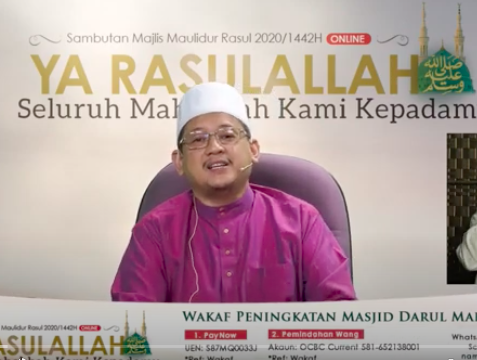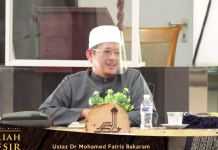بسم الله الرحمن الرحيم
Bismi-llāhi r-raḥmāni r-raḥīm
In the name of Allah, Most Gracious, Most Merciful
اللهم صلي على سيدنا محمد وعلى اله وصحبه وسلم
Allahumma salli ala Sayyidina Muhammad wa ala alihi wa sahbihi wasallim
O Allah, send your peace and blessings upon our Master Muhammad and upon his family and companions
This article is a summary of takeaways from Ustaz Dr Mohamed Fatris Bakaram’s Tafsir Online Lecture on 25th October 2020. This special lecture, delivered in Malay, is entitled “Rasulullah SAW Tokoh Perubahan Minda” and was delivered as part of the Maulidur Rasul 2020/1442H celebrations at Darul Makmur Mosque.
We will resume with the Tafsir lectures next week insyaa Allah. Summaries of previous lectures on Surah Maryam, Surah Taha, Surah Al-Anbiya’ and Surah Al-Hajj can be found here. The previous lecture of Surah Al-Mu’minun (Verses 31-41) can be found here.
Introduction
Let us begin this session by expressing our greatest praise and gratitude for Allah SWT, the Most Merciful, the Most Generous, the Most Loving and the Most Forgiving. All praise belongs to Allah SWT, Lord of the Worlds, who has given us bountiful blessings that can never be counted. May these blessings make us amongst the faithful servants of Allah SWT who want to continue serving Him SWT to the best of our ability with hearts full of humility.
In this blessed month of Rabi’ul Awal, we pray that Allah SWT will grant us His Taufiq and Hidayah and soften our hearts, so that the seedlings of love and longing for our beloved Prophet SAW may always thrive within our hearts.
Let us renew our resolve and desire to know Rasulullah SAW at a more intimate level. We want to be able to truly examine, understand and appreciate the sacrifices and struggles that he SAW made throughout his life.
Let us begin with the Salawat: Allahumma salli ala Sayyidina Muhammad wa ala alihi wa sahbihi wabaarik wasallim. We hope that with this Salawat, Allah will raise our status and He will reward us as the Ummah of Rasulullah SAW.
We pray that with this Salawat, Allah SWT will forgive our sins, grant us ease in our life, and eliminate any hardship or pain for us. May it become an investment for us for when we return to Allah SWT. May we be reunited with Rasulullah SAW in paradise one day. Ameen.
Regarding the topic for today, I have edited the initial title, “Rasulullah SAW: A Model for Mental Change” to “Rasulullah SAW: A Model for Mind Change”. We normally hear of the world “Mental” to refer to health matters related to the brain.
What we want to speak about instead is the idea of the “Mind”; we are referring to the thinking culture, the norms, habits, and ways of thinking. Rasulullah SAW was someone who had the ability to change our minds so that we may become more capable creations that are more able to make the fullest use of the minds that have been gifted to us. Rasulullah SAW changed the mindsets of people of his time and the people of today.
A Mercy to the Worlds
We know that Rasulullah SAW was sent by Allah SWT with certain roles and goals in mind. Of them, Allah SWT tells us in Surah Al-Anbiya’:
وَمَآ أَرۡسَلۡنَٰكَ إِلَّا رَحۡمَةٗ لِّلۡعَٰلَمِينَ
And We have not sent you, [O Muhammad], except as a mercy to the worlds. [21:107]
The Mercy that was gifted to us through Rasulullah SAW is Mercy that is abundant, not scarce. This is something immense and bountiful. The Mercy sent to us is that which has shifted the history of the human world.
Human beings who used to look down upon the value of humanity, people who used to prioritise worldly gains such as wealth, status and lineage have gotten their minds transformed, to set aside all the material benefits and to regard one another as equals in the sight of Allah SWT.
Human beings started to recognise themselves as being servants of Allah SWT, and that true honour comes only from Allah SWT. Allah raises our status when we lower ourselves in obedience to Him SWT.
We are taught that we are not judged our status and wealth but for the good in our hearts and the good that we do in seeking His pleasure SWT. We learnt to let go of the false status brought about by human desires and assumptions.
We begin to strive to raise our status in Allah SWT’s eyes by working on the purity of our hearts and the effort in our deeds. In history, we have seen even disbelievers – those who do not eventually accept Islam – shift their mindsets and stop looking at wealth and lineage as the defining feature in humanity.
We accept that we are born equals and what we seek is not that which is temporary, but that which is everlasting – honour when we return to Allah SWT eventually.
An Exception from the Norm
Rasulullah SAW was a person who was honoured by Allah SWT. His honour has been displayed throughout his life – in childhood, youth, and adulthood, up until the time when he received Prophethood.
Even since young, he SWT was not someone who was easily swayed by the norms of the community. He did not participate in activities that were not deemed suitable for humanity. He had never drunk a single drop of alcohol because it interferes with the consciousness of the mind.
This was despite alcohol consumption being part of the norms amongst the adults and youth of his time. Rasulullah SAW was not known to loiter around like the other youth.
He had never once participated in the commonplace festivals and parties that were filled with vice and indecency. Rasulullah SAW had never looked down upon, much less mocked or insulted anyone viewed to be of lower status to him.
There was never once in his life that he bowed down in front of any of the idols being worshipped by the bulk of the population in his community.
Rasulullah SAW was someone who was not only protected by Allah SWT, but he was also someone who was mature and wise – he was clear in his thought. He would never do something just because other people did it.
He was not afraid of going against the culture and norms of people. He made his own decisions when he considered what was being done by his community.
Even before revelation came down, Rasulullah SAW saw how alcohol could take away the human being’s ability to make sound decisions and to think logically. And so, he distanced himself from it.
He saw how degrading the acts conducted by his people were, he noted the detriments of free-mixing and unrestrained relationships between genders, and so he avoided them. He saw no benefit in worshipping idols, so he chose to practice the religion of Prophet Ibrahim AS, the belief of one God.
Rasulullah SAW was an independent thinker. He made his own decisions based on his own thoughts and opinions. He SAW was not someone who subscribed to herd mentality.
What this term means is that people are not likely to make decisions based on their own thoughts, but according to what is being done by people around them. Human beings are inherently afraid of not belonging, of sticking out from the crowd, and being identified as different from other people.
People tend to follow what people do based on what people feel is ok. Rasulullah SWT was not someone who would perform acts that we considered the norm just because they were what was normal and acceptable at that point of time.
Avoid Herd Mentality
There is hadith that supports this, it is said to be weak in its chain of transmission, but scholars agree that the content is one that is strong and not conflicting with anything we know of the religion, and as such it should be practiced and held onto. The hadith states:
تَكُونُوا إِمَّعَةً تَقُولُونَ إِنْ أَحْسَنَ النَّاسُ أَحْسَنَّا وَإِنْ ظَلَمُوا ظَلَمْنَا وَلَكِنْ وَطِّنُوا أَنْفُسَكُمْ إِنْ أَحْسَنَ النَّاسُ أَنْ تُحْسِنُوا وَإِنْ أَسَاءُوا فَلاَ تَظْلِمُوا
“Do not let yourselves be ‘yes-men’, saying: ‘If the people are good then we will be good, and if they are wrong then we will be wrong.
Rather, make up your own minds, if the people are good then you are good, and if they are evil, then do not behave unjustly.” [Tirmidhi]
It was clear that Rasulullah SAW was not merely sent as a messenger but also as someone tasked with the role of changing how human beings think, and as a result how they behave. He was a changer of mindsets.
People of that time used to think based on how the clan thinks. If someone in the clan commits a wrong against that of another clan, the people of the clan would still choose to support the wrongdoer, for as long as he is their clan member.
The Reconstruction of the Ka’bah
There was an incident that happened before Rasulullah SAW became a prophet. There had been a huge flood that damaged a part of the Ka’bah. The people of Quraysh, including Rasulullah SAW, therefore came together to repair and rebuild the Ka’bah.
During the process of moving construction materials, Rasulullah SAW’s uncle, who was working with him, proposed to him to remove his shirt and wear it on his head as protection from any dust or sand that may be flying around.
Rasulullah SAW was someone of exemplary character and morals. He was known for his shyness even in his youth. When he lifted his shirt up to wear it on his head, he tripped – not once but twice.
This made him think that perhaps uncovering his upper body was not suitable for him, someone who has always taken care of his appearance and dressed modestly. Rasulullah SAW therefore removed the head covering and put his shirt back on.
When the Ka’bah’s reconstruction was almost complete, there came an issue that emerged where the last bit of the Ka’bah, the Hajar Al-Aswad or the Black Stone was to be returned to the Ka’bah wall.
An argument broke out amongst the people, trying to decide who should replace the stone to its rightful position. The people of Makkah saw the role of placing the stone back as something honourable; no clan member wanted anyone but their chief to get the honour that they felt was rightfully theirs.
The people argued and debated continuously. It came to a point where the youth of each clan had taken arms and were ready to battle to earn that role for their clan.
In the books of history, it was said that these youths even submerged their hands in a container of blood as a pledge of allegiance to their clan to show that they were ready to fight for that right.
The arguments went on for five days before an elder spoke up saying that a civil war was not worth the honour. He proposed that the first person to enter the area around the Ka’bah would get the responsibility of deciding what the next action was.
By Allah SWT’s will, the first person to enter the door was Rasulullah SAW. Upon his arrival, everyone was satisfied. They knew that Muhammad SAW was someone trustworthy, who would judge justly and not wrong anyone.
Rasulullah SAW also belonged to a clan; his clan was also amongst the people who had fought for the honour of returning the Hajar Al-Aswad. Yet, he SAW was not limited by herd mentality.
With the new authority he was given, he could have decided to place the black stone back himself. He could have selected a senior from his own tribe to do so.
Instead, he prepared a cloth, placed the Hajar Al-Aswad on it and called upon the leaders of each tribe. All the leaders held onto the cloth and walked together to bring it to the Ka’ba.
At the Ka’ba, Rasulullah SAW himself lifted the stone up and placed it in its rightful place. The solution was found. Rasulullah earned even greater respect from his people.
Herd Mentality was not in the vocabulary of Rasulullah SAW. There was never an instance where Rasulullah SAW, having come from the tribe of Quraish himself, ever placed his tribesmen over those of other tribes.
In fact, after the Hijrah, the Ansar and the Muhajirun were paired up as companions or brothers. There was no special treatment given to the Quraish over other believers.
Whenever there was a conflict between his followers, Rasulullah SAW would resolve them immediately while ensuring that the ties of friendship and the values of equality and justice were maintained.
Whether they were foreigners or people from his family, they were all treated justly. There was no herd mentality involved in any decisions made by him.
Equal Punishment for Theft
There was an incident when a woman named Fathima Al-Makhzumiyyah (not the daughter of Rasulullah SAW) was found stealing. Everyone was aware of the punishment for being caught committing theft. In Islam, the punishment was serious.
The people of Fathima’s clan, Bani Makhzum, started getting worried. They met with a companion of the Prophet SAW to ask that he talk to Rasulullah SAW and ask for a reduction in the penalty towards her.
They brought up that they were a reputable clan, one that was renowned and had a high status. Someone from other less honourable tribes would have perhaps deserved such a punishment, but not them.
When the request was made to Rasulullah SAW, that Bani Makhzum was a reputed clan and Fathima should be given a reduced penalty, Rasulullah SAW’s facial expression changed.
He announced, “This does not only apply to Fathima from Bani Akhzum. Indeed, if Fathima daughter of Muhammad SAW stole, I would cut off her hand.”. The decision to punish is not made based on who the person is or which tribe they came from.
If it had been the family of the prophet himself, there would not have been any concession to the punishment received. Rasulullah made decisions based on justice, not on lineage and status.
Seeking Answers to Life’s Problems
As years passed and Rasulullah SAW and his family grew, when the Prophet was in his 30s, he started to ponder about life, about the community and the surroundings.
He reflected on who they were, what things were like, and what can be done to change things. Rasulullah SAW was inclined to worship only one God, but he was not sure how – his people were idol-worshippers.
Rasulullah SAW was unhappy seeing the community being immersed in vices. Oppression was widespread, people were cruel to one another, there was no way out for slaves, and the wealthy got away with anything.
Rasulullah SAW felt that there was something that had to be done but he was uncertain of what. This was what led him to distance himself from the people for periods of time to sit in isolation in the cave of Hira’.
He would sit and reflect, worshipping Allah SWT, surrendering his concerns to Allah SWT. From the top of the mountain, he would gaze upon his town and feel concern in his heart for his people.
He felt helpless, not knowing what to do to help his people out of their ignorance and foolishness. Rasulullah SAW was not someone to leave things as they are when he knew that something was not right. He did not just remain resigned expecting things to sort themselves out. Rasulullah SAW would proactively ponder about the problem to think of solutions.
This was what was mentioned in Surah Ad-Dhuha:
أَلَمْ يَجِدْكَ يَتِيمًۭا فَـَٔاوَىٰ
Did He not find you an orphan, and give you shelter? [93:6]
Allah SWT had reminded Rasulullah SAW that he had once been regarded as unwanted because he had been orphaned. Allah SWT had given him SAW protection.
وَوَجَدَكَ ضَآلًّۭا فَهَدَىٰ
Did He not find you in a state of Dhaal, then He guided you? [93:7]
The word Dhaal refers to a state of searching, a state of having lots of unanswered questions. Rasulullah SAW had been in the search of answers to the problems of the society. And Allah SWT guided him SAW. Allah gave him SAW the revelation as guidance along with new rules and regulations. All of this helped Rasulullah SAW to find the answers that he was seeking.
Rasulullah SAW was a model for mindset change because he showed that regardless of who we are and what life is like for us, we need to pause and look at our surroundings.
Have a look. What is happening in society? What needs to be done? What is currently lacking? What wrongs need to be righted? What vices can be eliminated? Rasulullah SAW was not someone who waited for problems to resolve themselves. He did not just go along with what other people did, he stepped forward to proactively seek solutions.
This is something that we need to develop as the Ummah of Rasulullah SAW. We need to have an introspective mentality, a desire to reflect and ponder what is within us in our hearts and in our minds.
As human beings, we are motivated to do things based on what we think, what we feel, what we assume, and what we desire. If what we are thinking is good, if what we desire is good, then insyaa Allah, what comes out of it will only be good.
Unfortunately, as human beings, our internal state is often not very good. We have bad assumptions, ill feelings towards people etc. If we do not check ourselves and filter our own thoughts, they will escape unnoticed.
When we do not have personal introspection, we may end up doing evil towards people, being oppressive without realising it. Self-introspection is a habit that is encouraged by the Prophet SAW. As a result of his reflecting in isolation, he was given revelation as guidance and an answer to his questions.
The Answer to Rasulullah SAW’s Questions
Subhanallah, the first revelation given, the first answer to his questions was a command to read. Reading does not mean reciting. It is not about phonetics, about sounds and words. It is about thinking, reflecting, examining, and understanding. To read is to understand. Allah SWT said “Iqra’!” (Read!). He did not say, “Read the book!” or “Read these words!”. He said:
ٱقْرَأْ بِٱسْمِ رَبِّكَ ٱلَّذِى خَلَقَ
Read! In the name of your Lord who created: [96:1]
خَلَقَ ٱلْإِنسَـٰنَ مِنْ عَلَقٍ
He created man from a clot. [96:2]
There is no specified object to read from. Allah SWT is telling us to read using our minds; He SWT wants us to think, reflect, examine, and research. Reading is commanded with the aim of reflecting upon creation.
Before looking towards the height of the mountains, the beauty of the Moon, the heat of the Sun, and the depths of the Sea, we are asked to take a look within ourselves, looking at our origin as a clot.
These were the first verses given to Rasulullah SAW, they were given as a spark to a revolution. Asking us to leap forward. It is not an instruction to take it easy and read when you can, but a command for mankind to jump up and think. Allah SWT then follows up with:
ٱقْرَأْ وَرَبُّكَ ٱلْأَكْرَمُ
Read! And your Lord is the Most Honourable, [96:3]
ٱلَّذِى عَلَّمَ بِٱلْقَلَمِ
Who taught (mankind) by the pen [96:4]
عَلَّمَ ٱلْإِنسَـٰنَ مَا لَمْ يَعْلَمْ
He taught man what he did not know. [96:5]
Subhanallah! The first verses ever to be revealed were instructions telling mankind to think. To ponder and to reflect. Because what started this revolution was introspection in isolation.
Rasulullah SAW did not isolate himself because he was fed up with the state of his society. He did not run to escape from the noise of the city. Rather, he isolated himself so he would be able to think. Subhanallah.
We need to have this introspection because we are the Ummah of Rasulullah SAW. Those of us who want to follow the Sunnah of the Prophet SAW need to be aware that the Sunnah is expansive.
Do not take only a small portion of the Sunnah and reject the rest. It is not just about reciting certain Wird, about dressing a certain way, eating a certain way, performing prayers a certain way etc.
Those are Sunnah, but amongst the sunnah of Rasulullah SAW is something that he has been doing even before revelation came down – that is the Sunnah of using your mind. It is about not letting your mind become one that is lazy, one that blindly accepts what is given. Your mind should be one that asks, that questions, and looks for answers.
The Qur’an is filled with verses that invite us to think. There are verses commanding us to reflect on the rain, the seas, the animals, the skies, the sun, the moon, the stars… everything!
أَفَلَا تَعْقِلُونَ
Do you not reason?
أَفَلَا يَتَدَبَّرُونَ
Do they not then reflect?
أَفَلَا تَذَكَّرُونَ
Will you not be reminded?
Allah SWT asks us over and over again, why would you not use your mind? Allah SWT is teaching us how to be the Ummah of Rasulullah SAW. The verses of the Qur’an are teaching us how to be followers of Rasulullah SAW’s example.
The Sunnah of the Prophet SAW is to make use of our mind. Subhanallah!
Eliminate Siege Mentality
After receiving revelation, he called towards faith. There were a couple of people who accepted his message but even more people who rejected his calls. He encountered many trials and tribulations, he was hurt, and mocked by people – and so were his companions.
In the end, their faith was firmed up by Allah SWT to become a generation that was firm and strong. A generation of people who were not easily swayed or who gave up easily.
If you look at Rasulullah SAW’s life, he had never once showed any signs of complaining or of blaming people. He had never once showed signs of weakness of faith or mind, of escaping responsibility for anything.
Rasulullah SAW taught us to have the faith to rise again, the faith to sort out the future, the faith to manage the pathway of life. What was wiped away from the minds of the Ummah is the siege mentality: a defensive or paranoid attitude based on the belief that others are hostile towards one.
This is the mentality that results in people claiming that whenever a problem arises, it is because we are victims. People do this and that to us, people are unhappy with our happiness, people are out to get us.
When we keep putting the blame on others, we do not have the confidence to take charge of our future. We are trapped in our past. We continuously search for excuses for why we are in the state that we are.
It is important to find answers to the ‘Why’s. What is more important than that though, is ‘What’s next?’. What can we do after this? This question is, if not more important than the ‘Why’, of equal importance. Do not just think about what has passed and why it happened. Think about what will happen next.
The evidence for this is that Rasulullah SAW has stated in a hadith:
الْمُؤْمِنُ الْقَوِيُّ خَيْرٌ وَأَحَبُّ إِلَى اللَّهِ مِنَ الْمُؤْمِنِ الضَّعِيفِ وَفِي كُلٍّ خَيْرٌ احْرِصْ عَلَى مَا يَنْفَعُكَ وَاسْتَعِنْ بِاللَّهِ وَلاَ تَعْجِزْ فَإِنْ أَصَابَكَ شَىْءٌ
فَلاَ تَقُلْ لَوْ أَنِّي فَعَلْتُ كَذَا وَكَذَا. وَلَكِنْ قُلْ قَدَّرَ اللَّهُ وَمَا شَاءَ فَعَلَ فَإِنَّ ” لَوْ ” تَفْتَحُ عَمَلَ الشَّيْطَانِ
The strong believer is better and more beloved to Allah than the weak believer, although both are good. Strive for that which will benefit you, seek the help of Allah, and do not feel helpless. If anything befalls you, do not say, “if only I had done such and such” rather say “Qaddara Allahu wa ma sha’a fa’ala (Allah has decreed and whatever he wills, He does).” For (saying) ‘If’ opens (the door) to the deeds of Shaitan.'” [Ibn Majah]
What Rasulullah SWT means by strength here is not just physical strength but also inner strength, having a strong spirit. Both believers have their goodness, however between the two, the strong believer is better and more beloved to Allah SWT.
Allah wants us to work whole-heartedly in seeking what is good. Do not ever become weak. Do not sit and sigh, complaining about what has happened, feeling resigned, and hopeless. That is siege mentality. Rasulullah SAW tells us to act, seek Allah SWT’s help and do not ever feel helpless.
When something does happen, do not ever regret, and say, “If only”. The saying of “if only” opens the doors to the deeds of Shaitan. At the end of the day, we ourselves will be disappointed, we will give up, we will feel helpless, and lose faith in ourselves.
Saying “If only” is a clear sign of someone not having resilience and inner strength. It is a sign of weakness of heart. It is a sign of someone who is unable to set their own life path. We know from Surah Ar-Ra’d that:
إِنَّ ٱللَّهَ لَا يُغَيِّرُ مَا بِقَوْمٍ حَتَّىٰ يُغَيِّرُوا۟ مَا بِأَنفُسِهِمْ
… Indeed, Allah does not change the condition of a people until they change what is within themselves… [13:11]
How does one change the condition within themselves? They do this by having faith, believing firmly and confidently that things will work out. This was how the companions were. They trusted Rasulullah SAW and had confidence.
When Rasulullah SAW asked them to make hijrah (to migrate), they did so. Even with all the uncertainty and the dangers of the unknown, they still went all out to defend their rights as believers of Allah SWT and Rasulullah SWT.
Key Takeaways from this Lecture
We have seen the Sunnah of Rasulullah SAW.
لَّقَدْ كَانَ لَكُمْ فِى رَسُولِ ٱللَّهِ أُسْوَةٌ حَسَنَةٌۭ لِّمَن كَانَ يَرْجُوا۟ ٱللَّهَ وَٱلْيَوْمَ ٱلْـَٔاخِرَ وَذَكَرَ ٱللَّهَ كَثِيرًۭا
Indeed, in the Messenger of Allah you have an excellent example for whoever has hope in Allah and the Last Day, and remembers Allah often. [33:21]
We are the Ummah of Rasulullah SAW, let us ignite his Sunnah in our lives. Read his hadith and practise his Sunnah. Whatever has been forbidden for us, we leave it completely.
This includes taking advantage of our brains, optimising the use of our minds, our capacity to think and evaluate. Do not blindly accept what is offered. Look for answers. Reflect upon what you find.
Examine what has happened. Evaluate what is to come. Do not just follow what other people choose to do. Do not be afraid to be different. Do not just sit and whine about what others have done to us.
Three takeaways from today: (1) Eliminate herd mentality, (2) Reflect and think, practise self-introspection, (3) Have confidence, eliminate siege mentality.
May Allah SWT grant us strength in our faith and firmness in our hearts. May we be granted confidence in our future, and may we find success at the end of our efforts, and Paradise as our reward. Ameen.
May Allah SWT grant us the opportunity to meet Rasulullah SAW in Paradise one day. May we be blessed with seeing his blessed smile in person. May we get the opportunity to kiss his blessed hands SAW.
Only the most beloved of people to Allah SWT, only those who are special in the sight of Allah SWT will get this blessing of being able to be in Rasulullah SAW’s presence. May we meet again next week insyaa Allah.
My dearest brothers and sisters, we are all the Ummah of Rasulullah SAW and so because of that, I would like to say that I truly love each and everyone of you because of Allah SWT.
——————–
Summary by: Arina Adom
Arina Adom is a lover of learning who takes on the world with an open mind. Resourceful and adaptable, always ready to take on new challenges. Comfortable working with diverse groups of people, yet able to work independently. Thrives under pressure. Currently seeking a meaningful career that enables her to impact lives directly and bring about positive changes in the lives of others in the community.
Arina graduated with a degree in Science ( Hons ), Life Science from NUS. She is currently taking a diploma in Quran and Sunnah Studies from Al Zuhri.
Watch Kuliah Tafsir again at
Masjid Darul Makmur’s Youtube
Watch and follow Kuliah Tafsir weekly
every Sunday after solat Maghrib

organised by Masjid Darul Makmur
Your contributions are appreciated. Get more details by clicking the image below.











